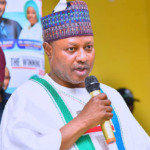During the Anti-Corruption Summit in London in 2016, former British Prime Minister, David Cameron, having an inkling or insight into Nigeria’s corrupt oil industry, in a conversation with the Archbishop of Canterbury coined Nigeria as “Fantastically Corrupt”. An angry Buhari who was at the summit, when asked by a reporter if that was true answered “Yes” and when further asked if he is going to demand for an apology from the Prime Minister he simply said “I will be demanding for the return of assets” meaning stolen assets by Nigerians and stashed away in UK (the safe haven and twin partner in our corruption?).
Nigeria has consistently ranked among the elites of corruption for the past four decades and I can dare say 90% of Nigeria’s corruption stems from its oil industry. Nigeria’s economy became a mono-economy, relying on oil for over 90% of its revenues. The oil industry was shrouded in secrecy without any semblance of transparency, akin to a ”Cosa Nostra”, thanks to Abdulsalmi Abubakar, who was the first Nigerian leader to refuse to award the Petroleum Ministry portfolio to anyone when he succeeded Abacha in 1998.
His successor, Olusegun Obasanjo followed suit and the Ministry was kept under his wrap for eight years. Yar’Adua appointed Rilwan Lukman (who happened to be IBBs Petroleum Minister way back between 1986-1990) while Jonathan appointed Diezani as minister to the Ministry, but when Buhari came, he resurrected what Abdulsalam and Obasanjo did (perhaps it is a military thing, right?).
Can a leader, civilian or military, combine the portfolios of the presidency and petroleum ministry? Before looking at the constitutional side, lets us see what the job entails first. A petroleum minister in Nigeria is responsible for implementation of policies and programmes; supervision of major parastatals under the ministry (NNPCL, NAPIMS, NLNG, DPR, NGC, NPDC and of course OPEC matters).
- Emefiele: Security beefed up at MMIA private terminal
- Al-Makura clears air on order for APC to vacate his building
He also oversees 7 other agencies under the ministry (NNPC, NURC, PTI, PTDF, NNRA, NCDMB and NMDPRA). Under the Petroleum Act, the minister is empowered to set prices of petroleum and he is the apex regulator of the industry. In fact, the alpha and omega of oil matters in the country.
It was because of such a demanding schedule that in 2002, the then Speaker of House of Representatives, Ghali Umar NaAbba challenged Obasanjo to appoint a minister of petroleum. But Obasanjo refused and sighted Section 5 of the 1999 Constitution which says “The Executive powers of the Federation are vested in the President who may exercise the same directly or through the Vice President, Ministers or officers in the public service of the Federation”. The rest was history as we all know.
Going back to history again, in 1977, The Punch Newspaper published an alleged loss of $2.8 Billion Dollars, during the first reign of the first petroleum Minister, Colonel Muhammadu Buhari.
The Obasanjo government set up a crude oil sales tribunal to investigate the operations of the Nigerian National Oil Company (NNOC) which later that same year metamorphosed into NNPC (and Buhari was its first chairman). The final findings of the Tribunal was that in 3 years the Nigerian National Oil Company had failed to collect its equity share of oil produced by Shell, Mobil and Gulf oil, amounting to 182.95 million barrels of oil production thereby losing $2.8 billion dollars. A precedent that would bedevil the oil industry for decades to come.
Fast forward to 2015, when Buhari was elected, he retained the Petroleum Ministry portfolio for two terms, making him the longest serving Minister of Petroleum in the history of the country (for 11 years). We have to take Buhari’s unglorified 8 years as a case study, considering he had the goodwill of the masses and all the right reasons to clean up the mess in our oil industry, but unfortunately, he worsened things up.
Ali Abubakar Sadiq wrote via [email protected]
 Join Daily Trust WhatsApp Community For Quick Access To News and Happenings Around You.
Join Daily Trust WhatsApp Community For Quick Access To News and Happenings Around You.

